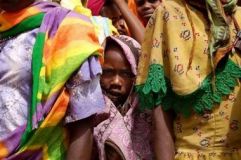Darfur conflict seen continuing despite peace deal
May 6, 2006 (LAGOS) — A peace deal signed by the largest rebel faction in Darfur and the Sudanese government will not end the three-year-old conflict, but could bring more protection for millions of refugees.
 The refusal of two rebel factions to join in the agreement on Friday, which marked the end of two years of talks in the Nigerian capital, illustrates that divisions between rival ethnic groups in Darfur have not been addressed.
The refusal of two rebel factions to join in the agreement on Friday, which marked the end of two years of talks in the Nigerian capital, illustrates that divisions between rival ethnic groups in Darfur have not been addressed.
Many analysts doubt the sincerity of the government, which holds the key to implementing the deal, because Khartoum has undermined so many agreements in the past.
“The government would make a mistake if they think that signing with one party will make peace,” Hassan Abdallah Ahmed, deputy leader of Islamist opposition Popular Congress Party, told Reuters.
A faction of the rebel Sudan Liberation Army (SLA) led by Minni Arcua Minnawi signed the peace deal with Khartoum under intense pressure from Western powers, who are exasperated by their impotence in the face of an onslaught on Darfur by government-backed militia that Washington called genocide.
Some commanders from a different SLA faction also signed, but rival factional leader Abdel Wahed Mohammed al-Nur and another rebel group, Justice and Equality Movement, refused.
“Signing an incomplete deal guarantees that there will be no peace in Darfur and that suits the government,” said John Prendergast, senior adviser to the International Crisis Group.
“I am sure the government will look to exploit divisions in the rebels to fuel fighting in Darfur. They are not interested in peace, only deflecting international criticism and pressure.”
Rebels took up arms against government-backed Arab militias in 2003 over what they saw as neglect and oppression by the Arab-dominated central government.
The camel-riding Janjaweed militias embarked on a campaign of arson, looting and rape which drove 2 million people into refugee camps, and tens of thousands died.
“The Darfur conflict will not be resolved until there is a dialogue between all the ethnic groups in Darfur,” said an analyst in Khartoum, asking not to be named.
“There is a real problem between nomads and urban groups,” he said, adding that neighbouring Eritrea and Chad were also fuelling the war.
PROTECTION FOR REFUGEES
Analysts were more optimistic about better protection for the millions of refugees, who are still exposed to attacks, and said the deal could speed the arrival of United Nations peacekeepers to the desert region the size of France.
Washington has been pushing to install U.N. peacekeepers with powers to intervene in the fighting, to replace a 7,000-strong African Union force which has proved too small and toothless to enforce a ceasefire.
Khartoum had insisted that a peace deal with the rebels was a precondition for any U.N. force.
“The other rebels (who refused to sign) would love to be spoilers. That is why the peace deal is only a first step and a robust force in Darfur is a must,” said Leslie Lefkow, a researcher at Human Rights Watch.
The United States said it would ask Rwanda to increase the AU presence by 1,200 troops, while waiting for the U.N. to assume control of a stronger force before the end of this year.
U.N. Secretary-General Kofi Annan said he would press Sudan to let U.N. planners into the region to prepare for deployment and urged donors to contribute humanitarian aid.
The United Nations was forced to halve its food aid to more than six million people in Sudan this month, half of them in Darfur, because donors came up with only one-third of its $746 million appeal this year.
(Reuters)
